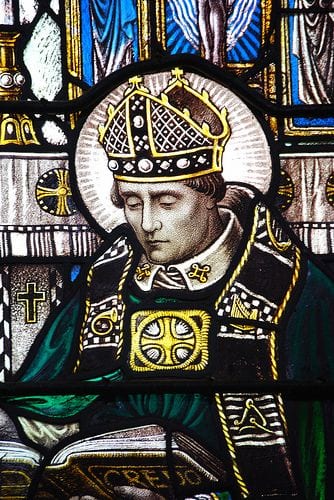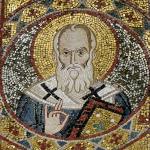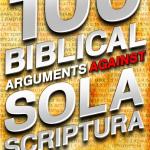
Protestant anti-Catholic polemicists David T. King and William Webster are the editors of a three-volume series, entitled, Holy Scripture: The Ground and Pillar of Our Faith (self-published by Webster’s outfit, Christian Resources Inc. [Battle Ground, Washington] in 2001). I’m most interested in Volume III: subtitled, “The Writings of the Church Fathers Affirming the Reformation Principle of Sola Scriptura” (edited by both Webster and King). In the Introduction to Vol. III (p. 9) they make the fantastically absurd, demonstrably false assertion:
[T]he Church fathers . . . universally taught sola Scriptura in the fullest sense of the term embracing both the material and formal sufficiency of Scripture.
The definition of sola Scriptura, according to three of the most able and articulate Protestant defenders of it in our time, is the following:
[T]he Bible alone is the infallible written authority for faith and morals (Norman Geisler)
Scripture . . . is the only inspired and inherently infallible norm, and therefore Scripture is the only final authoritative norm. (Keith A. Mathison)
The doctrine of sola scriptura . . . is that the Scriptures alone are sufficient to function as the regula fidei, the infallible rule of faith for the Church. (James R. White) [my bolding; see the sources for these quotations and also a fuller explication by each man]
Such a definition entails also understanding what sola Scriptura is not. It logically rules out tradition, the Church, ecumenical councils, bishops, popes, or appeal to apostolic succession as infallibly and finally authoritative. Only the Bible is that. Therefore, if any Church father believes that any of these are infallible or a final authority, then he (by the same token) does not and indeed cannot believe in sola Scriptura. I didn’t “set the rules”. Protestants have by defining sola Scriptura as they do. Thus, they have to live with their own definition and unbiblical rule of faith.
I shall be examining (in this series of papers) several Church fathers that Webster and King bring up, and documenting that they rejected sola Scriptura. I’ve already done this documentation with regard to Augustine, Athanasius, John Chrysostom, Jerome, Ambrose, Irenaeus, Justin Martyr, Clement of Alexandria, Hippolytus, Dionysius, Basil the Great, Cyril of Jerusalem, Theodoret, Gregory of Nyssa, Tertullian, Origen, Gregory Nazianzen, Epiphanius, Lactantius, Cyprian, Papias, and John Damascene.
All citations are from Volume III unless otherwise indicated.
*****
St. Hilary of Poitiers (c. 310-c. 367), as Wikipedia informs us, “was Bishop of Poitiers and a Doctor of the Church. He was sometimes referred to as the “Hammer of the Arians” . . . and the “Athanasius of the West”.
[see the online version of Hilary’s On the Trinity: from which almost all citations below are drawn]
Very unlike the case of St. Gregory Nazianzen, Webster and King produce quite a few citations from Hilary of Poitiers. None of them will prove their utterly futile enterprise of turning Hilary into a “Bible Alone Church father”, of course, but at least they gave it the ol’ college try. E for effort . . . First, they expend much energy (more than six pages) in a non sequitur effort of showing that Hilary believed in material sufficiency of Scripture:
. . . a man of blessed and religious will who yearns for a creed only according to the scriptures! (Liber II, Ad Constantium 8) [p. 52]
[L]et us assume that God has full knowledge of Himself, and bow with humble reverence to His words. He Whom we can only know through His own utterances is the fitting witness concerning Himself. (On the Trinity, Book I, 18) [p. 53]
We must proclaim, exactly as we shall find them in the words of Scripture, the majesty and functions of Father, Son, and Holy Spirit . . . (On the Trinity, Book II, 5) [p. 54]
[I]t is well with you if you be satisfied with the written word. (On the Trinity, Book III, 23) [p. 54]
[W]e . . . display on the evidence of Holy Scripture the impiety of their doctrines. (On the Trinity, Book IV, 11) [p. 55]
[W]e . . . cleave to the very letter of revelation. Each point in our enquiry shall be considered in the light of His instruction . . . (On the Trinity, Book IV, 14) [p. 56]
. . . according to the Scriptures, this being the safeguard of reverence against the attack of the adversary . . . [he goes on to repeat the phrase “according to the Scriptures” nine more times in the overall passage] (On the Trinity, Book X, 67) [p. 57]
The Apostle, the Evangelist, the Prophet combine to silence your objections. (On the Trinity, Book V, 33) [p. 58]
[W]e . . . adduce the evidence of the Gospels and the prophets for our confession . . . (On the Trinity, Book I, 17) [p. 176]
Since almost all Catholics agree with material sufficiency of Scripture, all of the above is a moot point. But Webster and King seem to think it proves something. It certainly doesn’t establish an adherence of sola Scriptura, since Catholics and Orthodox, who reject that false doctrine, also hold to it. In other words, it’s not exclusive to a sola Scriptura outlook.
Then they try to argue that Hilary believed in the perspicuity of Scripture (plain meanings to one and all, and self-interpreting):
. . . the plain words of Holy Writ . . . (On the Trinity, Book II, 3) [p. 53]
. . . by the clear teaching of the Evangelists and Apostles . . . (On the Trinity, Book VI, 4) [p. 58]
. . . clear assertions of prophets and evangelists to refute the insanity and ignorance of men . . . (On the Trinity, Book I, 17) [p. 176]
If we find ourselves in difficulty, let us lay the fault to our own reason; if God’s declaration seem involved in obscurity, let us assume that our want of faith is the cause. (On the Trinity, Book VII, 38) [p. 179]
He has so far tempered the language of His utterance as to enable the weakness of our nature to grasp and understand it. (On the Trinity, Book VIII, 43) [p. 180]
God out of regard for human weakness has not set forth the faith in bare and uncertain statements. (On the Trinity, Book VIII, 52) [p. 180]
The Lord enunciated the faith of the Gospel in the simplest words that could be found, and fitted His discourses to our understanding, so far as the weakness of our nature allowed Him . . . (On the Trinity, Book IX, 40) [p. 180]
[T]he Lord spoke in simple words for our instruction in the faith . . . (On the Trinity, Book XI, 7) [p. 180]
But Hilary taught (very un-Protestant-like) that the Church was necessary for individuals to understand the Bible. So much for a self-interpreting Scripture: a thing that Webster and King (p. 10) affirm as one of the premises of sola Scriptura:
They who are placed without the Church, cannot attain to any understanding of the divine word. For the ship exhibits a type of Church, the word of life placed and preached within which, they who are without, and lie near like barren and useless sands, cannot understand. (Homily 13:1 on Matthew)
Hilary believed in authoritative and decisive apostolic tradition and succession and ecumenical councils (all utterly contrary to sola Scriptura):
[W]e shall not recede from the faith … as once laid it continues even to this day, through the tradition of the fathers, according to the succession from the apostles, even to the discussion had at Nicea against the heresy which had, at that period, sprung up. (History Fragment 7)
. . . the apostolic faith to which we adhere . . . (On the Trinity, IV, 1)
. . . the apostolic faith and power. (On the Trinity, VI, 38)
. . . the Church, whose faith is based upon the teaching of Evangelists and Apostles, . . . (On the Trinity, VII, 7)
. . . the Apostolic faith . . . (On the Trinity, VII, 31 and again in 32; IX, 28; XII, 28, 51)
. . . the apostolic teaching . . . (On the Trinity, VIII, 2)
Hilary thought that the Church could by herself refute heretics, and would never defect from the Christian faith:
I trust that the Church, by the light of her doctrine, will so enlighten the world’s vain wisdom, that, even though it accept not the mystery of the faith, it will recognise that in our conflict with heretics we, and not they, are the true representatives of that mystery. . . . It is the peculiar property of the Church that when she is buffeted she is triumphant, when she is assaulted with argument she proves herself in the right, when she is deserted by her supporters she holds the field. (On the Trinity, VII, 4)
. . . that Church against which the gates of hell shall not prevail. (On the Trinity, VI, 38)
He also held that one must be in the bosom of the Church to be saved:
It is her wish that all men should remain at her side and in her bosom; if it lay with her, none would become unworthy to abide under the shelter of that august mother, none would be cast out or suffered to depart from her calm retreat. But when heretics desert her or she expels them, the loss she endures, in that she cannot save them, is compensated by an increased assurance that she alone can offer bliss. . . . The Church, ordained by the Lord and established by His Apostles, is one for all; . . . (On the Trinity, VII, 4)
The light, or lamp of Christ, is not now to be hidden under a bushel, nor to be concealed by any covering of the synagogue, but, hung on the wood of the Passion, it will give an everlasting light to those that dwell in the church. (Commentary on Matthew, 5:13)
He rejected sectarianism and denominationalism:
[T]he frantic folly of discordant sects has severed them from her. And it is obvious that these dissensions concerning the faith result from a distorted mind, which twists the words of Scripture into conformity with its opinion, instead of adjusting that opinion to the words of Scripture. And thus, amid the clash of mutually destructive errors, the Church stands revealed not only by her own teaching, but by that of her rivals. They are ranged, all of them, against her; and the very fact that she stands single and alone is her sufficient answer to their godless delusions. The hosts of heresy assemble themselves against her; each of them can defeat all the others, but not one can win a victory for itself. The only victory is the triumph which the Church celebrates over them all. (On the Trinity, VII, 4)
He thought one should follow the faith of the Church: not a faith of one’s own making:
. . . the clear and definite evidence of the Church’s faith . . . (On the Trinity, V, 30)
And this is the confession of faith made, in the fullness of time, by the Church in loyal devotion to Christ her Lord. (On the Trinity, V, 31)
. . . the Church’s faith, . . . (On the Trinity, V, 39; VI, 12; VI, 38; VII, 1, 31; VIII, 34)
The faith of the Church, . . . (On the Trinity, VI, 9; VI, 17; VIII, 2; IX, 2, 19, 36; X, 52)
[T]hey wish to rob the Church of her true faith . . . (On the Trinity, VI, 11)
. . . the Church’s doctrine, . . . (On the Trinity, VI, 45)
. . . the Church’s confession of faith. (On the Trinity, VII, 19)
All of this is evidence that Hilary of Poitiers definitely did not believe in sola Scriptura. But it would be easy to think he did, if all one read was the half-truth presentation of Webster and King, who deliberately ignored all of this contrary (and quite relevant) information (almost all from one book, easy to search), lest any of their readers would see that Hilary — like all the Church fathers — was Catholic and infinitely more similar in belief to present-day Catholicism than any form of Protestantism.
***
Photo credit: Hilary of Poitiers (Catholic.Net)
***
Summary: Hilary of Poitiers did not believe in sola Scriptura. But it would be easy to think he did, if all one read was the highly selective, “half-truth” presentation of William Webster and David T. King.
***













